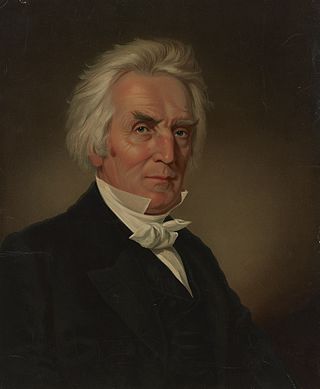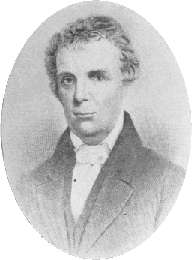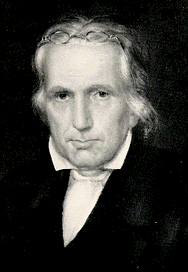
The Christian Church in the United States and Canada is a mainline Protestant Christian denomination. The denomination started with the Restoration Movement during the Second Great Awakening, first existing during the 19th century as a loose association of churches working towards Christian unity, then slowly forming quasi-denominational structures through missionary societies, regional associations, and an international convention. In 1968, the Disciples of Christ officially adopted a denominational structure at which time a group of churches left to remain nondenominational.
Restorationism, also known as Restitutionism or Christian primitivism, is a religious perspective according to which the early beliefs and practices of the followers of Jesus were lost or adulterated after his death and required "restoration". It is a view that often "seeks to correct faults or deficiencies by appealing to the primitive church as normative model".

The Restoration Movement is a Christian movement that began on the United States frontier during the Second Great Awakening (1790–1840) of the early 19th century. The pioneers of this movement were seeking to reform the church from within and sought "the unification of all Christians in a single body patterned after the church of the New Testament."

Alexander Campbell was an Ulster-Scots immigrant who became an ordained minister in the United States and joined his father Thomas Campbell as a leader of a reform effort that is historically known as the Restoration Movement, and by some as the "Stone-Campbell Movement." It resulted in the development of non-denominational Christian churches, which stressed reliance on scripture and few essentials.
Nondenominational Christianity consists of churches which typically distance themselves from the confessionalism or creedalism of other Christian communities by not formally aligning with a specific Christian denomination. Many non-denominational churches have a congregationalist polity, which is self-governing without a higher church authority. This is not absolute of all non-denominational churches though, as elder-ruled non-denominational churches have grown quite recently within networks like Acts 29.
The Churches of Christ, most commonly known as the Church of Christ or church of Christ, is a loose association of autonomous Christian congregations. The Churches of Christ are represented across the world. Typically, their distinguishing beliefs are that of the necessity of baptism for salvation and the prohibition of instruments in worship. Many Churches identify themselves as being nondenominational. The Churches of Christ arose in the United States from the Restoration Movement of 19th-century Christians who declared independence from denominations and traditional creeds. They sought "the unification of all Christians in a single body patterned after the original church of the New Testament."
Church of Christ may refer to:

The International Churches of Christ (ICOC) is a body of decentralized, co-operating, religiously conservative and racially integrated Christian congregations. Beginning with 30 members, they grew to 37,000 members within the first 12 years. In June 2022, the ICOC numbered their members at 118,094. A formal break was made from the Churches of Christ in 1993 with the organization of the International Churches of Christ.
The group of churches known as the Christian Churches and Churches of Christ is a fellowship of congregations within the Restoration Movement that have no formal denominational affiliation with other congregations, but still share many characteristics of belief and worship. Churches in this tradition are strongly congregationalist and have no formal denominational ties, and thus there is no proper name that is agreed to apply to the movement as a whole. Most congregations in this tradition include the words "Christian Church" or "Church of Christ" in their congregational name. Due to the lack of formal organization between congregations, there is a lack of official statistical data, but the 2016 Directory of the Ministry documents some 5000 congregations in the US and Canada; some estimate the number to be over 6,000 since this directory is unofficial.

Barton Warren Stone was an American evangelist during the early 19th-century Second Great Awakening in the United States. First ordained a Presbyterian minister, he and four other ministers of the Washington Presbytery resigned after arguments about doctrine and enforcement of policy by the Kentucky Synod. This was in 1803, after Stone had helped lead the mammoth Cane Ridge Revival, a several-day communion season attended by nearly 20,000 persons.
Thomas Wayne "Kip" McKean II is an American former minister of the International Churches of Christ and is a current minister of the City of Angels International Christian Church and World Missions Evangelist of the International Christian Churches, also known as the "Portland/Sold-Out Discipling Movement".

Thomas Campbell was a Presbyterian minister who became prominent during the Second Great Awakening of the United States. Born in County Down, he began a religious reform movement on the American frontier. He was joined in the work by his son, Alexander. Their movement, known as the "Disciples of Christ", merged in 1832 with the similar movement led by Barton W. Stone to form what is now described as the American Restoration Movement.
Daniel Sommer (1850–1940) was an American religious leader who was a key figure in the Restoration Movement and in the separation of the Churches of Christ from the Christian Church.
A disciple is a follower and student of a mentor, teacher, or other figure. It can refer to:
The Brush Run Church was one of the earliest congregations associated with the Restoration Movement that arose during the Second Great Awakening of the early 19th century. In 1811, a congregation of Christian reformers known as the Christian Association of Washington (Pennsylvania) reconstituted itself as a church and constructed a new building to replace the temporary log building where they began. Because it was built on the farm of William Gilchrist, near a stream called Brush Run, both the building and the congregation became known as Brush Run Church. It was the center of activity for Thomas and Alexander Campbell, father and son respectively, in their movement for Christian reform on the American frontier. The meeting house was later used as a blacksmith shop, then as a post office and finally it was moved to Bethany, Virginia.
The Christian Association of Washington was an organization established by Thomas Campbell in 1809 to promote Christian unity. It was a study group that Campbell formed with like minded friends and acquaintances in the local neighborhood of Washington, Pennsylvania. The group sought to foster unity by focusing on a common form of Christianity that they could all agree upon. This charter that Campbell wrote for this group, the Declaration and Address of the Christian Association of Washington, became one of the most important early texts of the Restoration Movement.
The Christians (Stone Movement) were a group arising during the Second Great Awakening of the early 19th century. The most prominent leader was Barton W. Stone. The group was committed to restoring primitive Christianity. It merged with the Disciples of Christ (Campbell Movement) in 1832 to form what is now described as the American Restoration Movement (also known as the Stone-Campbell Restoration Movement.)
The Disciples of Christ (Campbell Movement) were a group arising during the Second Great Awakening of the early 19th century. The most prominent leaders were Thomas and Alexander Campbell. The group was committed to restoring primitive Christianity. It merged with the Christians (Stone Movement) in 1832 to form what is now described as the American Restoration Movement (also known as the Stone–Campbell Restoration Movement).
The Millennial Harbinger was a religious magazine established by the early Restoration Movement leader Alexander Campbell in 1830. Campbell viewed the magazine as an important vehicle for promoting the religious reforms that he believed would help usher in the millennium.
Christian Church refers to what different Christian denominations conceive of as being the true body of Christians or the original institution established by Jesus.





